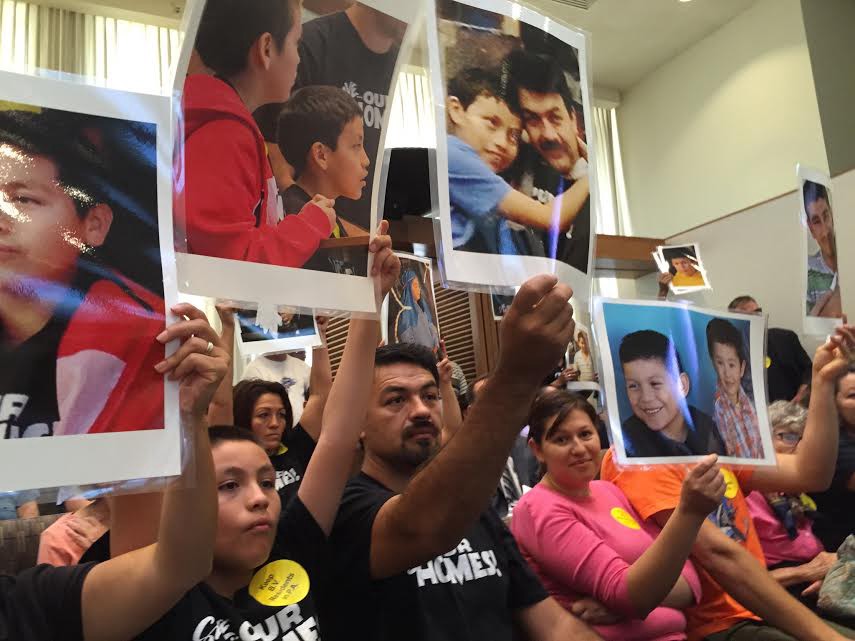The Last Trailer Park in Techland
by Andrew Thompson

In October 2013, Joe Jisser, the manager of Buena Vista Mobile Home Park in Palo Alto, sent a letter to the park’s four hundred and seventeen mostly low-income, mostly Hispanic residents. It informed them that his parents, Toufic and Eva Jisser, who own the park, were selling the property to a real estate developer. Buena Vista is the city’s last trailer park, and closing it will result in the loss of around a hundred units of affordable housing in one of the most expensive housing markets in the country. The ensuing legal battle became a fractious, public proxy fight over who gets to live in Palo Alto, a city that has been radically transformed by an influx of raw, uncut capital generated at bewildering scale by two technology booms in the past twenty years.
A somewhat arcane city law required the Jissers to pay to relocate the residents to a “comparable mobile-home park.” The Jissers maintained that comparable options existed in nearby towns like Sunnyvale and Redwood City; they offered to pay about fifty-five thousand dollars to each resident to move. Residents argued that any trailer park outside of Palo Alto is effectively incomparable, in large part because of its highly regarded public-school system — which has been a path to the middle class for many Buena Vista residents, like Erika Escalante, a program manager at the Palo Alto Medical Foundation who grew up in the park, and who I talked to last summer. A few months later, in December, a hearing officer appointed by the city sided with the Jissers, allowing them to close the park and relocate its residents outside of Palo Alto with six months notice, a decision reaffirmed by the city council.
But since January, in the background of the appeal hearings, local politicians and philanthropists have rallied to meet the Jissers’ asking price of the four-acre lot and purchase the park, allowing the residents to stay in their homes. By then, Prometheus, the developer to whom the Jissers originally planned to sell the land — and one of the largest developers in Silicon Valley — had already backed out of the process, reportedly turned off by the situation’s poor optics.
Exactly what the land underneath Buena Vista is now worth is uncertain. The Jissers initially rejected a fourteen-and-a-half million dollar offer cobbled together by the park’s residents in favor of a thirty-million-dollar bid from Prometheus. But in Palo Alto, even a figure of thirty million dollars, appraised in 2013, is profoundly outdated. Average housing prices in the past year alone have risen twenty-one percent, and at the current rate, Palo Alto home prices increase on average by about thirty-five thousand dollars per month. Prices move upward so briskly that the City Council, in its most recent decision in May, required the Jissers to conduct a new appraisal.
Buena Vista’s advocates have largely been galvanized around a now-standard Silicon Valley irony — that a region so concerned with “changing the world” is able to so fully ignore the indigence of its own residents. “This would fulfill Palo Alto’s estimation of itself, ‘We can do it, we can do anything, we have fabulous values, we are more innovative than anybody, we can solve problems,’” Winter Dellenbach, a retired civil rights lawyer and the park’s chief non-resident vanguard, told me. “So if Buena Vista doesn’t work out…” she trailed off.
The park’s supporters have quilted together thirty-nine million dollars to buy it on behalf of its current residents: fourteen-and-a-half million from the county (for every square foot of land that Stanford has developed since 1999, it has paid twenty dollars into a county fund for the development of low-income housing within six miles of the university); fourteen-and-a-half million dollars from the city, in matching funds; and ten million in the form of a tax-exempt bond from Caritas, a nonprofit that manages low-income mobile home parks, and which would likely manage the park if it was successfully purchased from the Jissers on behalf of its residents.
With additional fees and other anticipated costs, the total amount needed to purchase Buena Vista is stands at more than forty million dollars — at least three hundred forty thousand dollars per trailer — and could rise by millions more, depending on the outcome of a new appraisal. To raise additional funding, a local foundation has contacted several local tech plutocrats in the hopes that their charitable interests might align with Buena Vista’s needs.
The question of whether or not it’s worth it is really a question of, “What would this cost to replace this affordable housing unit if we lost it from our stock?” Joe Simitian, a local politician-of-all-trades who, at various points, has been Palo Alto’s mayor, state senator, and is now its county supervisor, told me. He pointed out that an affordable housing project built in 2014 that took a decade of politicking and fundraising to develop provided fifty units of housing at six hundred thousand dollars a unit.
No matter how much money supporters raise, the whole deal is, of course, contingent on the Jissers accepting the offer. Neither Jissers nor their lawyer could be reached for comment. “I’m in regular contact with the property owners,” Simitian said, adding that the decision to allow the Jissers to close the park was made on May 26th, “and Mr. Jisser and I were in my office the next morning at 10 o’clock. We’ve probably met four or five times in the intervening months. We talk on the phone. He wants to shop the property and get sense of what the market is for his property. But we talk and we’re still talking.”
Photo by Melody Cheney
